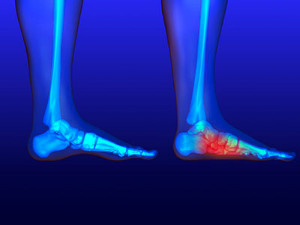 “About 20-30% of the population suffers from fallen arches in one or both feet.” Flat feet can be very problematic for runners. Those with flat feet have to be careful while training, stretching, and selecting running shoes. They have to know and pay attention to the warning signs of potential foot problems. Those with flat feet may also have a condition called plantar fasciitis, however stretching is the best way to prevent onset of this. Having shoes that fit properly is important for everyone, but it is especially important for those who have flat feet.
“About 20-30% of the population suffers from fallen arches in one or both feet.” Flat feet can be very problematic for runners. Those with flat feet have to be careful while training, stretching, and selecting running shoes. They have to know and pay attention to the warning signs of potential foot problems. Those with flat feet may also have a condition called plantar fasciitis, however stretching is the best way to prevent onset of this. Having shoes that fit properly is important for everyone, but it is especially important for those who have flat feet.
Flatfoot is a condition many people suffer from. If you have flat feet, contact Brent Harwood, DPM from Southeast Podiatry. Our doctor will treat your foot care needs.
What Are Flat Feet?
Flatfoot is a condition in which the arch of the foot is depressed and the sole of the foot is almost completely in contact with the ground. About 20-30% of the population generally has flat feet because their arches never formed during growth.
Conditions & Problems:
Having flat feet makes it difficult to run or walk because of the stress placed on the .
Alignment – The general alignment of your legs can be disrupted, because the move inward which can cause major discomfort.
Knees – If you have complications with your knees, flat feet can be a contributor to arthritis in that area.
Symptoms
Treatment
If you are experiencing pain and stress on the foot you may weaken the posterior tibial tendon, which runs around the inside of the .
If you have any questions please feel free to contact one of our offices located in Fairhope, Brewton, and Atmore, AL . We offer the newest diagnostic and treatment technologies for all your foot care needs.
Read more about Flat Feet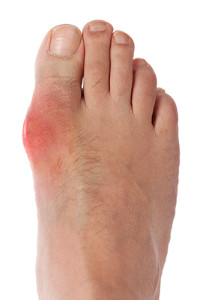 Gout, a common form of inflammatory arthritis, is a joint disease that can be particularly painful when it flares up. A certain diet has been found to lower levels of uric acid in the bloodstream. The DASH (Dietary Approaches to Stop Hypertension) diet, which is high in fruits and vegetables and low in salt, sugar, and red meat, can be very beneficial for people with gout. This diet is also low in purines, a compound that breaks down to form uric acid. After a study period of 26 years, doctors found that those who followed the DASH diet were less likely to develop gout compared to those who ate a typical Western diet.
Gout, a common form of inflammatory arthritis, is a joint disease that can be particularly painful when it flares up. A certain diet has been found to lower levels of uric acid in the bloodstream. The DASH (Dietary Approaches to Stop Hypertension) diet, which is high in fruits and vegetables and low in salt, sugar, and red meat, can be very beneficial for people with gout. This diet is also low in purines, a compound that breaks down to form uric acid. After a study period of 26 years, doctors found that those who followed the DASH diet were less likely to develop gout compared to those who ate a typical Western diet.
Gout is a foot condition that requires certain treatment and care. If you are seeking treatment, contact Brent Harwood, DPM from Southeast Podiatry. Our doctor will treat your foot care needs.
What Is Gout?
Gout is a type of arthritis caused by a buildup of uric acid in the bloodstream. It often develops in the foot, especially the big toe area, although it can manifest in other parts of the body as well. Gout can make walking and standing very painful and is especially common in diabetics and the obese.
People typically get gout because of a poor diet. Genetic predisposition is also a factor. The children of parents who have had gout frequently have a chance of developing it themselves.
Gout can easily be identified by redness and inflammation of the big toe and the surrounding areas of the foot. Other symptoms include extreme fatigue, joint pain, and running high fevers. Sometimes corticosteroid drugs can be prescribed to treat gout, but the best way to combat this disease is to get more exercise and eat a better diet.
If you have any questions please feel free to contact one of our offices located in Fairhope, Brewton, and Atmore, AL . We offer the newest diagnostic and treatment technologies for all your foot care needs.
Read more about Everything You Need to Know About Gout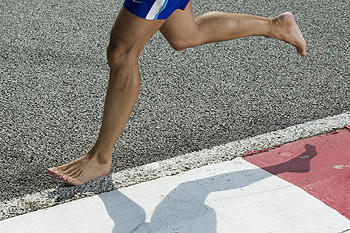 There are a lot of debates about whether or not barefoot running is beneficial for the feet. Although research suggests that there are several benefits from running barefoot, there are also plenty of risks. Running without shoes is proven to be hazardous due to dangerous debris or sharp rocks that may be on the ground. In order to prevent some of these issues, barefoot shoes were created. These shoes are able to simulate the feeling of running barefoot while reducing the dangers that may result from it.
There are a lot of debates about whether or not barefoot running is beneficial for the feet. Although research suggests that there are several benefits from running barefoot, there are also plenty of risks. Running without shoes is proven to be hazardous due to dangerous debris or sharp rocks that may be on the ground. In order to prevent some of these issues, barefoot shoes were created. These shoes are able to simulate the feeling of running barefoot while reducing the dangers that may result from it.
Barefoot running has its own share of benefits and disadvantages. If you have any concerns about your feet or , contact Brent Harwood, DPM from Southeast Podiatry. Our doctor will treat your foot care needs.
Barefoot Running
The Impact of Barefoot Running
The Advantages of Barefoot Running
The Drawbacks of Barefoot Running
So, what can runners do to make barefoot running safe? It’s best to make a slow transition from running shoes to barefoot running. Once the feet begin to adjust, try walking, then jogging and gradually increasing the distance. Minimalist running shoes may also be an option.
If you have any questions please feel free to contact one of one of our offices located in Fairhope, Brewton, and Atmore, AL . We offer the newest diagnostic and treatment technologies for all your foot care needs.
Read more about Barefoot Running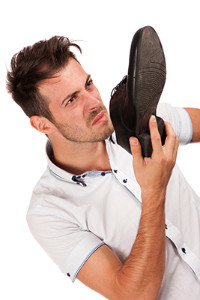 Athlete’s foot is a condition that many people may encounter at some point in their lives. While severe cases of the condition should be referred to a podiatrist, athlete’s foot prevention can be easy with the help of a few simple steps: Wash the feet thoroughly with soap and water, keep the feet clean and dry, wear clean socks and shoes, change shoes and socks often, practice good hygiene, wear sandals or slippers at a public shower or pool, use antifungal powder when needed, and wear shoes that are well-ventilated. Hygiene is key in preventing athlete’s foot and if practiced regularly, should keep the condition at bay.
Athlete’s foot is a condition that many people may encounter at some point in their lives. While severe cases of the condition should be referred to a podiatrist, athlete’s foot prevention can be easy with the help of a few simple steps: Wash the feet thoroughly with soap and water, keep the feet clean and dry, wear clean socks and shoes, change shoes and socks often, practice good hygiene, wear sandals or slippers at a public shower or pool, use antifungal powder when needed, and wear shoes that are well-ventilated. Hygiene is key in preventing athlete’s foot and if practiced regularly, should keep the condition at bay.
Athlete’s foot is an inconvenient condition that can be easily reduced with the proper treatment. If you have any concerns about your Feet, contact Brent Harwood, DPM from Southeast Podiatry. Our doctor will treat your foot care needs.
Athlete’s Foot: The Sole Story
Athlete's foot, also known as tinea pedis, can be an extremely contagious foot infection. It is commonly contracted in public changing areas and bathrooms, dormitory style living quarters, around locker rooms and public swimming pools, or anywhere your feet often come into contact with other people.
Solutions to Combat Athlete’s Foot
Athlete’s foot can cause many irritating symptoms such as dry and flaking skin, itching, and redness. Some more severe symptoms can include bleeding and cracked skin, intense itching and burning, and even pain when walking. In the worst cases, Athlete’s foot can cause blistering as well. Speak to your podiatrist for a better understanding of the different causes of Athlete’s foot, as well as help in determining which treatment options are best for you.
If you have any questions please feel free to contact one of our offices located in Fairhope, Brewton, and Atmore, AL . We offer the newest diagnostic and treatment technologies for all your foot care needs.
Read more about Athlete's Foot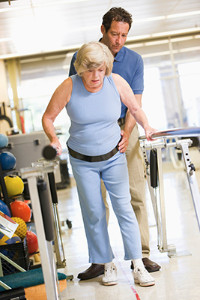 Foot diseases and other foot-related problems often become more prevalent as we age. Years of bearing body weight and certain ailments can combine to wreak havoc on the feet and ankles. The foot problems we may experience as time goes on vary from minor to potentially very serious. First and foremost, if you are a diabetic, foot care needs to be a high priority. Diabetic ulcers and sores, if left untreated, can lead to infection and even gangrene, resulting in amputation. Daily foot inspections are necessary to ensure that there are no cuts, sores, or swelling. Even something as seemingly minor as cracked skin on the foot can lead to terrible consequences if gone unnoticed. Using moisturizer and soap that doesn’t dry out the skin can help in this area. That being said, it is also important to keep the feet dry, as toenail fungus grows more readily in moist environments. Keeping the feet elevated is also a good tip. This will help circulate the blood to the lower extremities. Poor circulation can lead to serious medical conditions.
Foot diseases and other foot-related problems often become more prevalent as we age. Years of bearing body weight and certain ailments can combine to wreak havoc on the feet and ankles. The foot problems we may experience as time goes on vary from minor to potentially very serious. First and foremost, if you are a diabetic, foot care needs to be a high priority. Diabetic ulcers and sores, if left untreated, can lead to infection and even gangrene, resulting in amputation. Daily foot inspections are necessary to ensure that there are no cuts, sores, or swelling. Even something as seemingly minor as cracked skin on the foot can lead to terrible consequences if gone unnoticed. Using moisturizer and soap that doesn’t dry out the skin can help in this area. That being said, it is also important to keep the feet dry, as toenail fungus grows more readily in moist environments. Keeping the feet elevated is also a good tip. This will help circulate the blood to the lower extremities. Poor circulation can lead to serious medical conditions.
If you need your feet checked, contact Brent Harwood, DPM of Southeast Podiatry. Our doctor will attend to all of your foot and ankle needs and provide you with quality treatment.
Geriatrics and Podiatry
When people age, some common issues that may occur are bone density loss, dry skin, poor circulation, and rough brittle nails. These issues may also affect your foot health if the necessary steps are not taken to alleviate the problems.
It is important to take care of your feet because feet that are injured or diseased can affect your overall health. Having painful feet hinders your ability to do daily activities or may decrease your willingness to do the things that you need to do.
Visiting Your Geriatrician
As we age, health problems become more likely, so it is essential to visit your doctor for check-ups to ensure that you are doing the best you can to take care of your health. It is recommended to check your feet frequently for any possible cuts, bruises, swelling, corns or any other irregularities.
Taking Care of Elderly Feet
Cracked or dry feet can be treated by applying moisturizer often. It is also important not to wear old socks because the older the sock is, the higher the possibility there will be that there is bacteria there. Wear fresh socks and make sure they fit properly.
Proper foot health means that you can have a more active lifestyle and you will not be bogged down by pain. Foot health also leads to good circulation, which is paramount for overall health.
If you have any questions, please feel free to contact one of our offices located in Fairhope, Brewton, and Atmore, AL . We offer the newest diagnostic tools and technology to treat your foot and ankle needs.
Read more about Geriatrics and Podiatry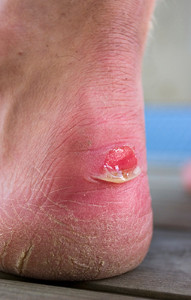 When Queen Elizabeth II breaks in a new pair of shoes, she doesn’t; she has a member of her staff break in her footwear for her. For many people, breaking in a new pair of shoes often results in uncomfortable pain and the formation of tender blisters on the feet. To avoid this issue altogether, the Queen instead gives her shoes to a junior member of Buckingham Palace staff who wears the same size. These shoes are then reportedly broken in by the staff member, who fulfills this task by walking up and down the palace corridors until the shoes have softened and become more comfortable. Long-time dressmaker for the queen, Stewart Parvin, revealed this information. While you may not be able to have someone break in your shoes for you, blisters can be avoided by gradually breaking in new shoes over a period of time.
When Queen Elizabeth II breaks in a new pair of shoes, she doesn’t; she has a member of her staff break in her footwear for her. For many people, breaking in a new pair of shoes often results in uncomfortable pain and the formation of tender blisters on the feet. To avoid this issue altogether, the Queen instead gives her shoes to a junior member of Buckingham Palace staff who wears the same size. These shoes are then reportedly broken in by the staff member, who fulfills this task by walking up and down the palace corridors until the shoes have softened and become more comfortable. Long-time dressmaker for the queen, Stewart Parvin, revealed this information. While you may not be able to have someone break in your shoes for you, blisters can be avoided by gradually breaking in new shoes over a period of time.
Blisters are prone to making everyday activities extremely uncomfortable. If your feet are hurting, contact Brent Harwood, DPM of Southeast Podiatry. Our doctor can provide the care you need to keep you pain-free and on your feet.
Foot Blisters
Foot blisters develop as a result of constantly wearing tight or ill-fitting footwear. This happens due to the constant rubbing from the shoe, which can often lead to pain.
What Are Foot Blisters?
A foot blister is a small fluid-filled pocket that forms on the upper-most layer of the skin. Blisters are filled with clear fluid and can lead to blood drainage or pus if the area becomes infected.
How Do Blisters Form?
Blisters on the feet are often the result of constant friction of skin and material, usually by shoe rubbing. Walking in sandals, boots, or shoes that don’t fit properly for long periods of time can result in a blister. Having consistent foot moisture and humidity can easily lead to blister formation.
Prevention & Treatment
It is important to properly care for the affected area in order to prevent infection and ease the pain. Do not lance the blister and use a Band-Aid to provide pain relief. Also, be sure to keep your feet dry and wear proper fitting shoes. If you see blood or pus in a blister, seek assistance from a podiatrist.
If you have any questions, please feel free to contact one of our offices located in Fairhope, Brewton, and Atmore, AL . We offer the newest diagnostic and treatment technologies for all your foot care needs.
Read more about Blisters on the Feet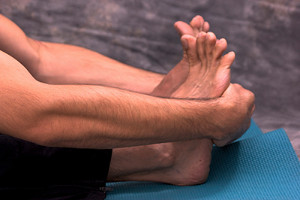 Plantar fasciitis is one of the most common causes of heel pain that podiatrists see in their patients. Plantar fasciitis involves the irritation or inflammation of the plantar fascia, which is a thick band of tissue located on the bottom of the foot that supports the arch and connects the heel to the toes. Irritation and inflammation typically occurs after overusing or overstretching the fascia, creating symptoms of pain. Wearing shoes that are not appropriate for the physical activities you engage in can also cause plantar fasciitis. Preventing plantar fasciitis involves properly stretching the feet and wearing shoes that suit the specific activities you may be performing that day.
Plantar fasciitis is one of the most common causes of heel pain that podiatrists see in their patients. Plantar fasciitis involves the irritation or inflammation of the plantar fascia, which is a thick band of tissue located on the bottom of the foot that supports the arch and connects the heel to the toes. Irritation and inflammation typically occurs after overusing or overstretching the fascia, creating symptoms of pain. Wearing shoes that are not appropriate for the physical activities you engage in can also cause plantar fasciitis. Preventing plantar fasciitis involves properly stretching the feet and wearing shoes that suit the specific activities you may be performing that day.
Plantar fasciitis can be very painful and inconvenient. If you are experiencing heel pain or symptoms of plantar fasciitis, contact Brent Harwood, DPM from Southeast Podiatry. Our doctor can provide the care you need to keep you pain-free and on your feet.
What Is Plantar Fasciitis?
Plantar fasciitis is the inflammation of the thick band of tissue that runs along the bottom of your foot, known as the plantar fascia, and causes mild to severe heel pain.
What Causes Plantar Fasciitis?
How Can It Be Treated?
While very treatable, plantar fasciitis is definitely not something that should be ignored. Especially in severe cases, speaking to your doctor right away is highly recommended to avoid complications and severe heel pain. Your podiatrist can work with you to provide the appropriate treatment options tailored to your condition.
If you have any questions please feel free to contact one of our offices located in Fairhope, Brewton, and Atmore, AL . We offer the newest diagnostic and treatment technologies for all your foot care needs.
Read more about Plantar Fasciitis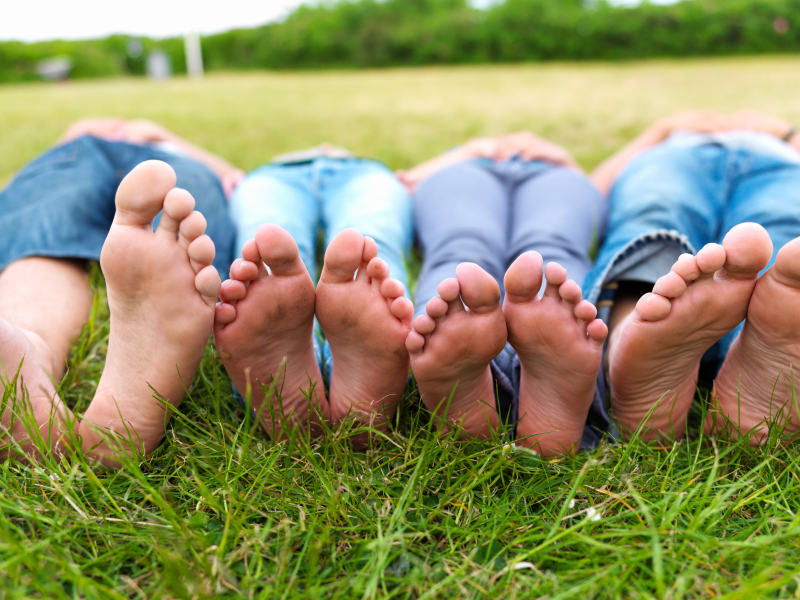 With the approach of warmer weather, many children are gearing up and preparing for fair-weather sports such as softball and soccer. Regardless of the sport your child may be participating in, injuries are bound to occur. To help protect your child’s feet for the upcoming season, consider the following tips. Be sure to have protective tape available to wrap around the , as tape can help prevent or brace sprains or fractures. Be sure your child is wearing shoes appropriate for the sport he or she is participating in, as this can not only improve your child’s performance, but also protect him or her from injury.
With the approach of warmer weather, many children are gearing up and preparing for fair-weather sports such as softball and soccer. Regardless of the sport your child may be participating in, injuries are bound to occur. To help protect your child’s feet for the upcoming season, consider the following tips. Be sure to have protective tape available to wrap around the , as tape can help prevent or brace sprains or fractures. Be sure your child is wearing shoes appropriate for the sport he or she is participating in, as this can not only improve your child’s performance, but also protect him or her from injury.
Making sure that your children maintain good foot health is very important as they grow. If you have any questions, contact Brent Harwood, DPM of Southeast Podiatry. Our doctor can provide the care you need to keep you pain-free and on your feet.
Keeping Children's Feet Healthy
Having healthy feet during childhood can help prevent medical problems later in life, namely in the back and legs. As children grow, their feet require different types of care. Here are some things to consider...
Although babies do not walk yet, it is still very important to take care of their feet.
Avoid putting tight shoes or socks on his or her feet.
Allow the baby to stretch and kick his or her feet to feel comfortable.
As a toddler, kids are now on the move and begin to develop differently. At this age, toddlers are getting a feel for walking, so don’t be alarmed if your toddler is unsteady or ‘walks funny’.
As your child gets older, it is important to teach them how to take care of their feet.
Show them proper hygiene to prevent infections such as fungus.
Be watchful for any pain or injury.
Have all injuries checked by a doctor as soon as possible.
Comfortable, protective shoes should always be worn, especially at play.
If you have any questions please feel free to contact one of our offices located in Fairhope, Brewton, and Atmore, AL . We offer the newest diagnostic and treatment technologies for all your foot care needs.
Read more about What to Do to Keep Your Child’s Feet Healthy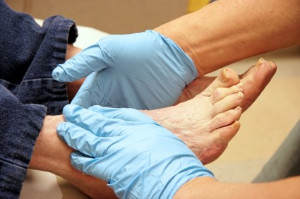 For people who live with diabetes, footcare should be high on the list of concerns related to overall health. Due to constricted blood flow or nerve damage, diabetics need to take extra care to avoid potential foot and leg injuries. Walking barefoot is not typically a good idea, as you may not feel it when you step on something sharp. Proper inspection is also very important. Be sure to check your legs and feet for any kind of sores or lesions. Gone unnoticed or untreated, these wounds can quickly become infected and lead to very serious consequences like amputation. Along with daily personal inspection, make sure you have your feet checked often by a podiatrist.
For people who live with diabetes, footcare should be high on the list of concerns related to overall health. Due to constricted blood flow or nerve damage, diabetics need to take extra care to avoid potential foot and leg injuries. Walking barefoot is not typically a good idea, as you may not feel it when you step on something sharp. Proper inspection is also very important. Be sure to check your legs and feet for any kind of sores or lesions. Gone unnoticed or untreated, these wounds can quickly become infected and lead to very serious consequences like amputation. Along with daily personal inspection, make sure you have your feet checked often by a podiatrist.
Diabetic foot care is important in preventing foot ailments such as ulcers. If you are suffering from diabetes or have any other concerns about your feet, contact Brent Harwood, DPM from Southeast Podiatry. Our doctor can provide the care you need to keep you pain-free and on your feet.
Diabetic Foot Care
Diabetes affects millions of people every year. The condition can damage blood vessels in many parts of the body, especially the feet. Because of this, taking care of your feet is essential if you have diabetes, and having a podiatrist help monitor your foot health is highly recommended.
The Importance of Caring for Your Feet
Patients with diabetes should have their doctor monitor their blood levels, as blood sugar levels play such a huge role in diabetic care. Monitoring these levels on a regular basis is highly advised.
It is always best to inform your healthcare professional of any concerns you may have regarding your feet, especially for diabetic patients. Early treatment and routine foot examinations are keys to maintaining proper health, especially because severe complications can arise if proper treatment is not applied.
If you have any questions please feel free to contact one of our offices located in Fairhope, Brewton, and Atmore, AL . We offer the newest diagnostic and treatment technologies for all your foot care needs.
Read more about How to Care for Diabetic Foot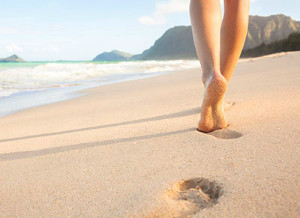 Traveling can be exciting, but nothing can ruin a trip like foot pain. And that’s not all that you need to watch out for when jet setting. Sitting in a small airplane seat, especially on a long flight, can lead to cramping and discomfort. In order to avoid this, try to walk the aisles as much as you can and stretch frequently. Drinking plenty of water and doing your best to avoid alcohol is also a good tip to avoid the aches and pains of a flight. When you land, there’s a good chance that you’ll be doing some walking. Be sure to wear comfortable shoes to avoid blisters and swelling. Remember, you can’t take a vacation from your feet.
Traveling can be exciting, but nothing can ruin a trip like foot pain. And that’s not all that you need to watch out for when jet setting. Sitting in a small airplane seat, especially on a long flight, can lead to cramping and discomfort. In order to avoid this, try to walk the aisles as much as you can and stretch frequently. Drinking plenty of water and doing your best to avoid alcohol is also a good tip to avoid the aches and pains of a flight. When you land, there’s a good chance that you’ll be doing some walking. Be sure to wear comfortable shoes to avoid blisters and swelling. Remember, you can’t take a vacation from your feet.
Everyday foot care is very important to prevent infection and other foot ailments. If you need your feet checked, contact Brent Harwood, DPM from Southeast Podiatry. Our doctor can provide the care you need to keep you pain-free and on your feet.
Everyday Foot Care
Often, people take care of their bodies, face and hair more so than they do for their feet. But the feet are a very important aspect of our bodies, and one that we should pay more attention to. Without our feet, we would not be able to perform most daily tasks.
It is best to check your feet regularly to make sure there are no new bruises or cuts that you may not have noticed before. For dry feet, moisturizer can easily be a remedy and can be applied as often as necessary to the affected areas. Wearing shoes that fit well can also help you maintain good foot health, as well as making it easier to walk and do daily activities without the stress or pain of ill-fitting shoes, high heels, or even flip flops. Wearing clean socks with closed shoes is important to ensure that sweat and bacteria do not accumulate within the shoe. Clean socks help to prevent Athlete’s foot, fungi problems, bad odors, and can absorb sweat.
If you have any questions please feel free to contact one of our offices located in Fairhope, Brewton, and Atmore, AL . We offer the newest diagnostic and treatment technologies for all your foot care needs.
Read more about Every Day Foot Care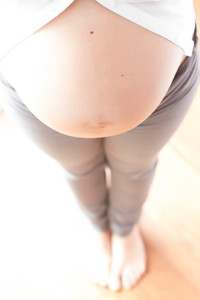 Pregnancy can create additional pressure on the feet, making certain everyday activities and responsibilities difficult for women. Women who work desk jobs should ensure that they’re sitting in chairs that offer optimal support, while women who spend a majority of their time standing should occasionally elevate their feet using a foot rest. Wearing comfortable shoes is also a must and should never be overlooked. Elevating the feet can also help pregnant women in managing edema, as the feet often swell during pregnancy.
Pregnancy can create additional pressure on the feet, making certain everyday activities and responsibilities difficult for women. Women who work desk jobs should ensure that they’re sitting in chairs that offer optimal support, while women who spend a majority of their time standing should occasionally elevate their feet using a foot rest. Wearing comfortable shoes is also a must and should never be overlooked. Elevating the feet can also help pregnant women in managing edema, as the feet often swell during pregnancy.
Pregnant women with swollen feet can be treated with a variety of different methods that are readily available. For more information about other cures for swollen feet during pregnancy, consult with Brent Harwood, DPM from Southeast Podiatry. Our doctor will attend to all of your foot care needs.
What Foot Problems Can Arise During Pregnancy?
One problem that can occur is overpronation, which occurs when the arch of the foot flattens and tends to roll inward. This can cause pain and discomfort in your heels while you’re walking or even just standing up, trying to support your baby.
Another problem is edema, or swelling in the extremities. This often affects the feet during pregnancy but tends to occur in the later stages.
How Can I Keep My Feet Healthy During Pregnancy?
If you have any questions please feel free to contact one of our offices located in Fairhope, Brewton, and Atmore, AL . We offer the newest diagnostic and treatment technologies for all your foot care needs.
Read more about Pregnancy and Foot Health Those who spend a large amount of time putting pressure on their feet are prone to developing blisters, or pockets of fluid between layers of skin which develop due to friction. Minor blisters should not be popped, and instead left alone and covered to provide cushioning and avoid further friction. Prevent the development of blisters by wearing proper-fitting shoes and socks that provide ample comfort and support. Be sure to treat blisters immediately after discovery to avoid pain and disruption of daily activities. If a blister ruptures, immediately disinfect the area and treat it with antibiotic ointment. Consult with a doctor if the pain persists or there is any sign of infection.
Those who spend a large amount of time putting pressure on their feet are prone to developing blisters, or pockets of fluid between layers of skin which develop due to friction. Minor blisters should not be popped, and instead left alone and covered to provide cushioning and avoid further friction. Prevent the development of blisters by wearing proper-fitting shoes and socks that provide ample comfort and support. Be sure to treat blisters immediately after discovery to avoid pain and disruption of daily activities. If a blister ruptures, immediately disinfect the area and treat it with antibiotic ointment. Consult with a doctor if the pain persists or there is any sign of infection.
Blisters are prone to making everyday activities extremely uncomfortable. If your feet are hurting, contact Brent Harwood, DPM of Southeast Podiatry. Our doctor can provide the care you need to keep you pain-free and on your feet.
Foot Blisters
Foot blisters develop as a result of constantly wearing tight or ill-fitting footwear. This happens due to the constant rubbing from the shoe, which can often lead to pain.
What Are Foot Blisters?
A foot blister is a small fluid-filled pocket that forms on the upper-most layer of the skin. Blisters are filled with clear fluid and can lead to blood drainage or pus if the area becomes infected.
How Do Blisters Form?
Blisters on the feet are often the result of constant friction of skin and material, usually by shoe rubbing. Walking in sandals, boots, or shoes that don’t fit properly for long periods of time can result in a blister. Having consistent foot moisture and humidity can easily lead to blister formation.
Prevention & Treatment
It is important to properly care for the affected area in order to prevent infection and ease the pain. Do not lance the blister and use a Band-Aid to provide pain relief. Also, be sure to keep your feet dry and wear proper fitting shoes. If you see blood or pus in a blister, seek assistance from a podiatrist.
If you have any questions, please feel free to contact one of our offices located in Fairhope, Brewton, and Atmore, AL . We offer the newest diagnostic and treatment technologies for all your foot care needs.
Read more about Blisters on the Feet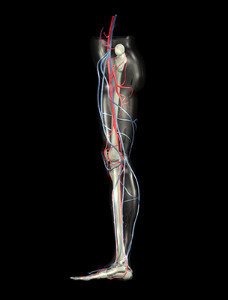 If your feet feel cold, especially during these winter months, it is because it is your body’s natural response for conserving heat when it is too cold. Your body “tries to maintain its internal temperature by constricting small blood vessels under the surface of the skin. This allows more blood to move deeper in the body, so your core stays warm.” However, this causes your body’s extremities, like the feet, to receive poor blood circulation. When taking care of your cold feet, try to wear warm, breathable socks that help wick away moisture. Opt for wool in place of cotton. Other methods include warming your feet up in warm water, drinking hot liquids, moving around to get your blood circulation going, and investing in shoe inserts to help insulate the insides of your shoes.
If your feet feel cold, especially during these winter months, it is because it is your body’s natural response for conserving heat when it is too cold. Your body “tries to maintain its internal temperature by constricting small blood vessels under the surface of the skin. This allows more blood to move deeper in the body, so your core stays warm.” However, this causes your body’s extremities, like the feet, to receive poor blood circulation. When taking care of your cold feet, try to wear warm, breathable socks that help wick away moisture. Opt for wool in place of cotton. Other methods include warming your feet up in warm water, drinking hot liquids, moving around to get your blood circulation going, and investing in shoe inserts to help insulate the insides of your shoes.
Poor circulation is a serious condition and needs immediate medical attention. If you have any concerns with poor circulation in your feet contact Brent Harwood, DPM of Southeast Podiatry. Our doctor will treat your foot care needs.
Poor Circulation in the Feet
Poor blood circulation in the feet and legs is can be caused by peripheral artery disease (PAD), which is the result of a buildup of plaque in the arteries.
Plaque buildup or atherosclerosis results from excess calcium and cholesterol in the bloodstream. This can restrict the amount of blood which can flow through the arteries. Poor blood circulation in the feet and legs are sometimes caused by inflammation in the blood vessels, known as vasculitis.
Causes
Lack of oxygen and oxygen from poor blood circulation restricts muscle growth and development. It can also cause:
Those who have diabetes or smoke are at greatest risk for poor circulation, as are those who are over 50. If you have poor circulation in the feet and legs it may be caused by PAD and is important to make changes to your lifestyle in order to reduce risk of getting a heart attack or stroke. Exercise and maintaining a healthy lifestyle will dramatically improve conditions.
As always, see a podiatrist as he or she will assist in finding a regimen that suits you. A podiatrist can also prescribe you any needed medication.
If you have any questions please feel free to contact one of our offices located in Fairhope, Brewton, and Atmore, AL . We offer the newest diagnostic and treatment technologies for all your foot care needs.
Read more about Causes, Symptoms, and Treatment of Poor Blood Circulation in the Feet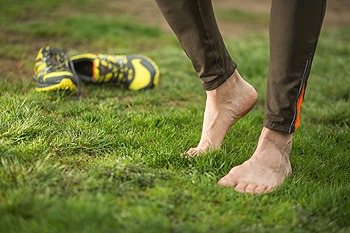 Morton’s neuroma, caused by a thickening of tissue around the nerves in your toes, usually happens between the third and fourth toes, causing a feeling like something is stuck in your sock. Your foot, which has more than 100 muscles, 26 bones, and 33 joints, is a very complex structure, which is why foot pain can be so common. Morton’s neuroma is often treated fairly simply, by things like foot and arch supports, anti-inflammatories, orthotics, and physical therapy. It is always important to discuss with your doctor the treatment plan that is right for you. This condition must be treated to ensure that no additional foot complications develop over time.
Morton’s neuroma, caused by a thickening of tissue around the nerves in your toes, usually happens between the third and fourth toes, causing a feeling like something is stuck in your sock. Your foot, which has more than 100 muscles, 26 bones, and 33 joints, is a very complex structure, which is why foot pain can be so common. Morton’s neuroma is often treated fairly simply, by things like foot and arch supports, anti-inflammatories, orthotics, and physical therapy. It is always important to discuss with your doctor the treatment plan that is right for you. This condition must be treated to ensure that no additional foot complications develop over time.
Morton’s neuroma is a very uncomfortable condition to live with. If you think you have Morton’s neuroma, contact Brent Harwood, DPM of Southeast Podiatry. Our doctor will attend to all of your foot care needs and answer any of your related questions.
Morton’s Neuroma
Morton's neuroma is a painful foot condition that commonly affects the areas between the second and third or third and fourth toe, although other areas of the foot are also susceptible. Morton’s neuroma is caused by an inflamed nerve in the foot that is being squeezed and aggravated by surrounding bones.
What Increases the Chances of Having Morton’s Neuroma?
Morton’s neuroma is a very treatable condition. Orthotics and shoe inserts can often be used to alleviate the pain on the forefront of the feet. In more severe cases, corticosteroids can also be prescribed. In order to figure out the best treatment for your neuroma, it’s recommended to seek the care of a podiatrist who can diagnose your condition and provide different treatment options.
If you have any questions, please feel free to contact one of our offices located in Fairhope, Brewton, and Atmore, AL . We offer the newest diagnostic and treatment technologies for all your foot care needs.
Read more about Morton's Neuroma